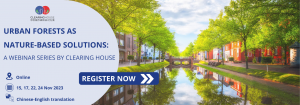
This event is the third of a new webinar series proposed by the EU-funded project CLEARING HOUSE.
About CLEARING HOUSE
Clearing House addresses a global challenge that unites European and Chinese cities in their quest to develop more resilient cities and liveable societies in order to improve human wellbeing. Its main focus is on tree-based green infrastructure which is the basis for “urban forests as nature-based solutions”. Urban Forests as nature-based solutions (UF-NbS) are a subset of nature-based solutions that build on tree-based urban ecosystems to address societal challenges, simultaneously providing ecosystem services for human well-being and biodiversity benefits. UF-NbS include peri-urban and urban forests, forested parks, small woods in urban areas, and trees in public and private spaces.
About the webinar series
Based on the thematic guidelines developed by CLEARING HOUSE experts to assist stakeholders across Europe, China, and globally in implementing Urban Forests as Nature-Based Solutions (UFNBS), four webinars are being delivered on November 15, 17, 22 and 24.
Each webinar will be available in English and Mandarin with live translations. Target audience for the webinars include professionals and practitioners spanning policy, planning, and practice.
Webinar 3: Empower your local communities: Participatory Urban Forest Design and Management
Participatory approaches play a crucial role in designing neighborhoods, as they offer undeniable advantages compared to conventional processes managed solely by professionals or public stakeholders. Learn how urban and peri-urban UF-NbS projects can best involve the public/civil society from the outset to mitigate conflict and simultaneously legitimize the process. How can the public be engaged? How can effective participation be fostered? What challenges can the participation process generate and how should they be addressed?
Keynote speech by Jerylee Wilkes-Allemann, senior scientist at the Bern University of Applied Sciences, School of Agricultural, Forest and Food Sciences (HAFL)
Case studies examples
- Llobregat&CO living co-creation laboratory (Barcelona, Spain) presented by Eugènia Vidal, Architect, Urban Design and Planning Department at Àrea Metropolitana de Barcelona (AMB)
- Chinese Case Study – TBC
Moderation by Ivana Zivojinovic, Senior Researcher at the Institute of Forest, Environmental and Natural Resource Policy, and the Forest Policy Research Network of European Forest Institute (EFI)
